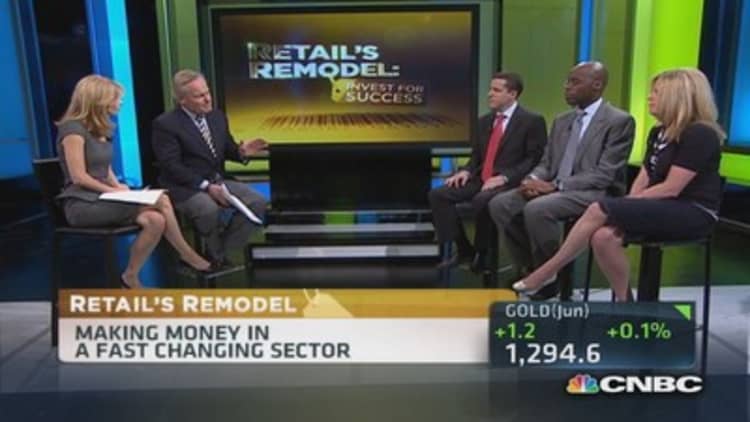In today's world of online product reviews and price comparisons, who needs the help of a sales associate?
According to a new study by University of Pennsylvania professor Marshall Fisher, plenty of people—a realization that could add up to big bucks for retailers.
Based on findings from Fisher's study, done in conjunction with Experticity, a consulting firm that provides retailers with a training platform for its sales employees, more than 50 percent of shoppers still seek advice when they enter a store.
As a result, educated and engaged store associates who could meet consumers' needs—especially knowledge about a specific product—rang up sales that on average brought in 69 percent more money than those who didn't, the study found.
"That is points of margin … for a big retailer," Experticity CEO Tom Stockham said. "This is a big, big lever."
Read MoreThe $1.5 trillion opportunity retailers overlook
Fisher's study tracked 63,500 associates at more than 330 stores over the course of two years, and accounted for variations such as the different selling seasons and how long an individual employee had worked for the particular retailer. It found that not only do well-versed salespeople bring more customers to the register, but they also ring up higher sales per checkout.
By actively helping shoppers with their problems, an educated sales staff also drives repeat store visits and makes people less likely to return what they purchased, Stockham said.
Experticity's training program varies by retailer, but typically consists of associates watching a short video or reading text about general retail practices or the brand and then taking a quiz on what they just learned.

Athletic shoe brand New Balance has been using Experticity's training platform since 2008, said Jonathan Hogan, the company's sales planning/training coordinator. Three times a year, New Balance creates a seven-module training session that can be completed in about 20 minutes.
New Balance has seen its sales increase 7 to 10 percent when the associates working at retailers who carry its brands, such as Dick's Sporting Goods, complete the training, Hogan said.
Although the brand doesn't require the training, it encourages the sales staff to participate by offering a 40 percent discount on its products and by making the modules into competitions, such as rewarding the associate who completes the quizzes in the fastest time.
Read MoreWal-Mart's biggest problem: Its customers
It becomes a win-win for both the brand and the retailer.
"We want [the associates] to become brand ambassadors," Hogan said. "They buy that shoe, they then run in it, they walk in it—they can relate to a consumer when they come in."
To date, nearly 145,000 associates have completed New Balance's training, Hogan said.
Despite incentives, Stockham said, the biggest challenges in tapping into a salesperson's full potential are finding people who are passionate about their brand and job—which many times is a temporary gig—and changing the retailers' long-entrenched culture of treating people as a dollar figure.
"The fundamental flaw is retailers think of personnel as a cost center," he said. "That's what makes this hard."
Adding the human factor
Fisher's study comes as some have questioned the role of the store associate, as more and more consumers research products before they head out to the store. In many cases, they've already read reviews and product details before getting into their cars, and they know exactly what they want before crossing the threshold.
According to a recent study by Deloitte consulting group, by the end of 2014, half of all in-store sales will be influenced by digital devices.
Read MoreIt's not just Sears—6 mistakes US stores make
What's more, many shoppers actually prefer to find answers on their own. A new study by IntelliResponse technology solutions firm found that among 1,000 online shoppers in the U.S., 68 percent said a company's website is the first place they go when they're looking for information on a certain item or service.
This is largely due to shoppers' expectation that they should be able to find answers to their questions at the time and place of their choosing, IntelliResponse CEO David Lloyd said. In some cases, it's because the shopper feels they are more knowledgeable than the salesperson, due to the retail industry's high turnover.
"We trust what we learn ourselves," Lloyd said. "Everyone wants to feel empowered when they're in a situation when they're spending their hard-earned money."
Mobile apps aid process
Stockham admitted that customers who have already decided what they're going to buy might not need the help of an associate. They also probably don't need much help when buying certain consumer staples, such as toilet paper. But in some cases, technology doesn't replace the salesperson—it complements them.
Lloyd said that because consumers today are coming in armed with knowledge, associates' roles have shifted into more of a consulting role. He said the future of sales associates' usefulness rests on an ability to pair the shopper's technology with the associate's knowledge.
MicroStrategy, a software platform provider that has worked with Gucci and specialty store Guess on developing mobile apps, is doing just that. It's working on a capability that will allow shoppers to request help from associates via their smartphone, which will launch by the end of the year.
Through this technology, when shoppers ask for help on their smartphone, the sales associate will be sent selected information directly from the customer's app, including their wishlist.
"The employee is [then] best prepared to start the conversation about the type of items [the shopper] wants to buy," said Bernhard Webler, vice president retail solutions at MicroStrategy.
—By CNBC's Krystina Gustafson.


